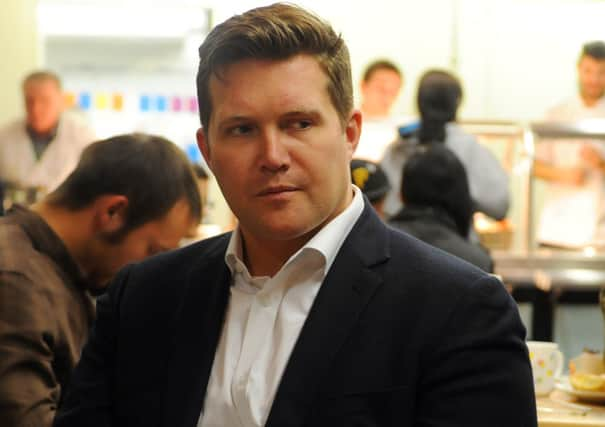New Leeds owners ‘will buy back Elland Road for £15m’


A consortium led by United managing director David Haigh is bidding to buy a 75 per cent stake in the Championship club.
The group - which is believed to include Andrew Flowers, the managing director of current shirt sponsors Enterprise Insurance - have signed a share acquisition agreement with GFH Capital, the Dubai-based firm that purchased United from Ken Bates a year ago.
Advertisement
Hide AdAdvertisement
Hide AdFootball League approval is now being sought as this buyout would be the second of the club in as many seasons. Providing there are no late hiccups, the Haigh-led consortium is expected to take charge early in the New Year.
As revealed in this newspaper yesterday, re-signing former Player of the Year, Max Gradel, in the January transfer window is high on the list of targets for the prospective new owners.
However, sources close to Haigh’s group have also made it clear to the Yorkshire Post that buying back Elland Road will be their top priority once at the helm.
United’s home was sold to Manchester businessman Jacob Adler for a knockdown £8m price in November, 2004, as mounting debts threatened to drag the club under in its first year outside the Premier League.
Advertisement
Hide AdAdvertisement
Hide AdOwnership passed the following year to Teak Commercial Limited, a firm based in the British Virgin Islands.
Included in the initial sale and leaseback deal with Adler - and something retained in the subsequent sale to Teak - was a buyback option that allows the club to purchase the stadium at a set price.
That amount rises each October and today stands at £15m. Also subject to a raise of three per cent each October is the rent United pay to Teak, which this year will cost the club £1.4m.
Since Elland Road was sold to Adler by the United board that was led by Gerald Krasner, United have paid around £11m in rent.
Advertisement
Hide AdAdvertisement
Hide AdRemoving that financial millstone from around United’s neck will, the source close to Haigh’s group insists, be the overriding priority providing the expected takeover goes through early in 2014.
Regardless of whether the club’s would-be new owners are successful or not in that quest, United’s tenancy in LS11 is secure thanks to the terms of the 2004 sale and lease-back arrangement - a deal in which the owner of a large asset, such as property, sells it and then immediately buys back from the buyer the right to use the asset under a lease for a fixed term at a pre-arranged rent.
In United’s case, that agreement was for a 25-year lease that, once at an end in 2029, can be extended by a further quarter of a century. This means Leeds’ future at Elland Road is safe for at least the next 41 years.
Haigh and his fellow would-be investors, however, are well aware that buying back the ground would be the clearest signal yet to supporters that the club is moving in the right direction.
Advertisement
Hide AdAdvertisement
Hide AdIf they are successful in that quest, it will be the second time in a generation that United will have bought back their home thanks to improving financial fortunes.
The first instance came in 1998 when Peter Ridsdale’s board paid £10m to Leeds City Council for the stadium, which along with the surrounding land had been sold 13 years earlier to the local authority for a quarter of that sum.
Crippling debts of around £1.5m had forced the 1985 sale on the club. History then repeated itself in 2004, though by then the sums involved had multiplied dramatically.
Krasner’s board had taken over Leeds in March of that year but relegation just a couple of months later hit United very hard.
Advertisement
Hide AdAdvertisement
Hide AdA fire-sale of players such as Alan Smith and Mark Viduka during that summer bought the club respite for a time but by the early months of the 2004-05 campaign it was clear Leeds were still in the financial mire.
Debts that had, at one stage, stood north of £100m when the takeover went through had been slashed to around £25m.
However, punishing repayments to Jack Petchey, a London-born businessman who had once been chairman of Watford and an Aston Villa shareholder, for a £15m loan taken out by Krasner and his fellow directors when buying the club had started to bite.
After negotiations with a number of parties that included Sebastien Sainsbury and local businessman Norman Stubbs floundered, the United board was left with no option but to sell the club’s only two remaining assets of substance - Elland Road and Thorp Arch, the latter’s sale raising £4.2m.
Advertisement
Hide AdAdvertisement
Hide AdOnce the two sales were concluded, the remaining debt of £9.2m to Petchey was cleared.
United’s financial woes continued, however, and the club was subsequently sold to Bates the following January.
At his first press conference, the former Chelsea chairman said: “It is our intention, in the fullness of time, to exercise those options and bring the land and stadium back where they belong.”
Scarcity of funds, though, meant those wishes went unfulfilled with a bid to buyback Thorp Arch floundering at the 11th hour in 2009.
Advertisement
Hide AdAdvertisement
Hide AdSimilar sentiments about purcahasing Elland Road were expressed by GFH Capital following their December 21 takeover last year but, again, nothing concrete came of the plans.
Haigh and his fellow would-be owners are determined to avoid a repeat providing their own takeover goes through, as expected, early in the New Year.